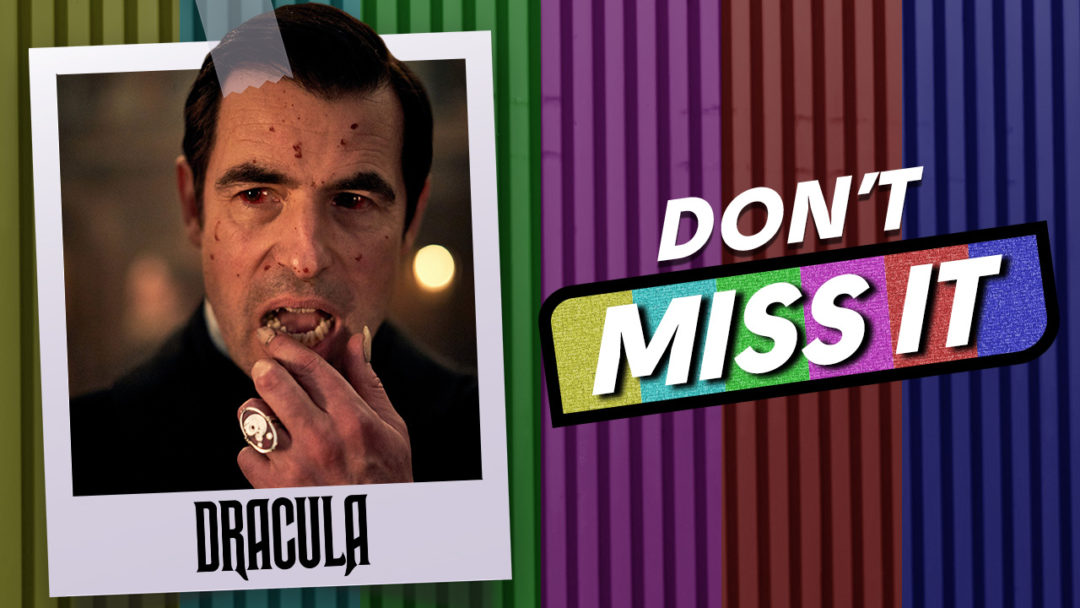There are very few texts as ubiquitous as Bram Stoker’s Dracula.
Stoker didn’t exactly invent vampires, drawing from a rich tradition of European folklore and other sources. However, he defined that breed of monsters. Stoker’s Dracula casts a long shadow over popular culture. Very few characters have penetrated the zeitgeist to the same degree as the eponymous aristocrat; very few stories have been told and retold as frequently as that novel.
This makes Dracula the perfect fodder for writers Steven Moffat and Mark Gatiss. The pair have experience reworking and reinventing classic literary characters for the 21st century, having cut their teeth on the breakout British hit Sherlock, starring Benedict Cumberbatch as an update to the iconic detective.
Dracula is arguably even more suited to the sensibilities of Gatiss and Moffat. Gatiss is a bona fides horror aficionado. He often appears as a talking head in discussions of the genre and its history. He presented the three-part documentary A History of Horror and scripted The Tractate Middoth, The Dead Room, and Martin’s Close, adaptations of M.R. James’ works, for the BBC.
Dracula plays to Gatiss’ fascination with Gothic horror. Claes Bang provides a suitably archetypal iteration of the character, the veteran Danish actor exuding mystique as he skulks around his giant castle in a stylish cape. Dracula offers a version of the character that draws on a variety of earlier iterations, unapologetically channeling Bela Lugosi and Christopher Lee.

This iteration of Count Dracula is also distinct. In this way, Dracula plays to the strengths of co-writer Steven Moffat. While Gatiss’ sensibilities tend to be more classical and old-fashioned, Moffat is a much more modern writer. Moffat is obsessed with the stories that we tell and the way that we tell them, often interrogating them to suggest more fundamental truths nestled at their core.
Moffat has talked about imbuing the character with the traits audiences associate with heroes. As played by Bang, Dracula is smart, charming, and funny. Like Moffat’s protagonists on Doctor Who and Sherlock, he is the quintessential “great man.” Moffat’s male heroes are often great men learning to be good. Dracula is a great man completely devoid of goodness. He is the great man as a monster.
In its first two episodes, Dracula leans into the character’s iconography, drawing rather loosely from the text while riffing on familiar tropes. The opening episode takes the character back to his cinematic roots, with the castle exteriors using the same location that F.W. Murnau used for Nosferatu in 1922. The second episode offers a sinister take on Agatha Christie aboard the doomed freighter Demeter.
While it always retains a sense of humor about itself, Dracula is refreshingly graphic in its horror, willing to capture the depravity and monstrosity of its subject matter. Bram Stoker’s text has always been a body horror, and the opening episodes of Dracula understand that. Flesh rots and bones snap; bodies contort and grotesque parodies of birth play themselves out with endearing commitment.

As with a lot of Moffat’s work, Dracula is also very much engaged in the art of storytelling. Dolly Wells is cast as Sister Agatha, the nun who interrogates Jonathan Harker (John Heffernan) after his escape from Castle Dracula. Sister Agatha is presented as a critic interrogating the idea of Dracula. Her survival repeatedly depends on her efforts to understand a character or resolve a plot thread.
Over the course of its three episodes, Dracula unravels and remixes its source material. It filters the core concept of the classic horror novel through a variety of sensibilities and settings. As the series unfolds, the narrative unspools. The story bends into strange shapes. Even then, distant echoes of familiar story beats resonate.
The third and final episode is likely to be divisive and polarizing, particularly in contrast to the more traditional narratives of the first two installments. It is a little too compressed, refusing to allow its remix of the source material to fully breathe amid its hurried plotting. It could be argued that the final stretch of the series bites off more than it can chew. Yet it certainly never lacks for ambition.
Dracula offers something old and something new, blended together. Like the title character, the result is something strange and macabre, but nonetheless alluring. It’s a bloody good time.
Dracula is available on the BBC iPlayer in the United Kingdom but is also available on Netflix internationally.






Published: Jan 5, 2020 01:00 pm